Corian Countertops Review & Buyer’s Guide
Corian countertops are a classic kitchen design option that offers an exciting range of colors in a durable solid surface material. Innovative and customizable, Corian material can be applied to any surface and molded into shapes that cater to modern design sensibilities. Whether you want to replicate marble veining or design with a bold and vibrant color, Corian countertops are a modern solution for the kitchen, bathroom or office. Read on to learn all about Corian countertop pros and cons, colors and pricing for your next project.
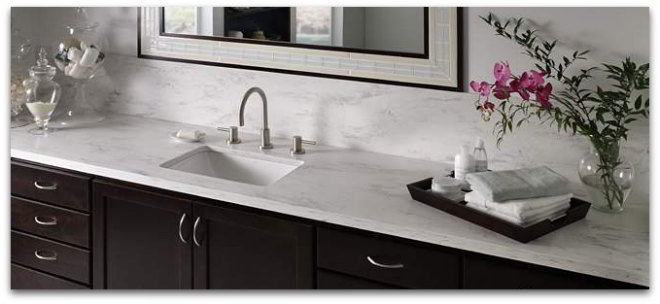
On This Page...
- What is Corian Made Of?
- Corian Countertops Pros & Cons
- Corian Countertop Colors
- Corian Countertops Cost
- Corian Countertop Maintenance
- Corian Repair & Warranty
- How & Where To Buy Corian Countertops
What is Corian Made of?
Initially developed in 1967 by DuPont, Corian has long been recognized as a pioneering solid surface material. Despite being overshadowed by more luxurious materials like granite and quartz, Corian’s unique combination of flexibility, durability, and aesthetic appeal keeps it relevant in contemporary design. This versatility makes Corian countertop material a great choice for both kitchen and bathroom applications.
Corian, which also makes Zodiac quartz counters, is a DuPont brand solid surface countertop material, created by blending acrylic polymers with minerals, poured into molds to form half-inch-thick sheets. Corian is lauded for its consistent composition, making it durable and easily repairable.
The standout feature of Corian is its ability to create virtually invisible seams. These seamless joints have a monolithic appearance that is not possible with other countertop materials. The technology used to join the countertop sections creates a visually continuous surface, especially for solid colors or simple patterns.
Epoxy countertops and cultured marble are similar countertop materials that utilize various resins, mixes, and/or molds to form surfaces.
Other brands that offer similar solid surface materials include Staron, Swanstone, and Meganite. Despite differences in manufacturers’ formulas, the core characteristics remain consistent across brands.
See how Corian countertops compare to a granite or quartz countertop.
Why Choose Corian Countertops?
Corian’s capacity for innovation extends beyond aesthetics to include functional features that can transform a kitchen’s utility. Among the most intriguing is its ability to integrate wireless charging technology. By embedding wireless charging pads within the countertop, users can charge devices simply by placing them on the surface, eliminating the clutter of cords and enhancing convenience.
Another advanced feature is illumination. Corian countertops can be backlit to create striking visual effects and subtle ambient lighting. This feature is particularly useful for creating mood lighting in kitchens, bathrooms and commercial installations.
Corian surfaces must still be installed in pieces or sections like other materials. So, your countertop will have seams. But Corian usually creates a monolithic, "seamless" look with most colors—especially solids. Seams may still be visible on more elaborate patterns with a less consistent design. Concrete countertops and glass countertops can also be formed into complex shapes or molds, but Corian is definitely the most versatile. Considering there's little to like about visible seams, Corian or any solid surface material is the clear winner in this category.
Corian Countertops Pros & Cons
Understanding the advantages and potential drawbacks of Corian countertops helps homeowners make the right choice of countertop material.
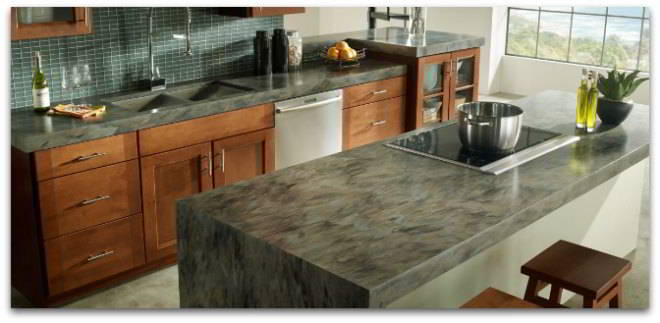
Corian Countertop Pros:
- Variety of Colors: Over 100 color options with modern patterns.
- Non-Porous Surface: With no sealing needed, Corian is easy to clean and hygienic, resisting mold, mildew, and bacterial growth.
- Seamless Appearance: Corian’s ability to create nearly invisible seams lets designers achieve a sleek, continuous surface.
- Design Flexibility: Corian can be thermoformed into various shapes to create curved counters, integrated sinks and custom drainboards.
- Advanced Function: Corian fabricators can offer innovative features like integrated wireless charging capabilities and surface illumination.
- Repairability: Minor scratches and damages can be easily buffed out, making Corian a practical choice for high-use areas.
Corian Countertop Cons:
- Susceptibility to Scratches and Heat: Corian is softer than other countertop materials, making it prone to scratches and requiring protection to avoid heat marks.
- Chemical Sensitivity: Certain aggressive cleaners can discolor the Corian surface, so homeowners should use pH-neutral cleaning solutions.
- Resale Value: Corian does not generally command as high a resale value as natural stones like granite and quartz.
Corian Countertop Colors
Corian countertop material has evolved from its original monochrome and speckled patterns to include a wide array of modern patterns and vibrant hues. From classic whites and grays to playful yellows and blues, the spectrum caters to both minimalist and bold design palettes. Some colors integrate up to 20% recycled materials, appealing to eco-conscious consumers.
Corian Countertop Colors now include marble, terrazzo and wood looks, for stylish and modern bathrooms and kitchens.
 Corian countertops Artista Sage
Corian countertops Artista Sage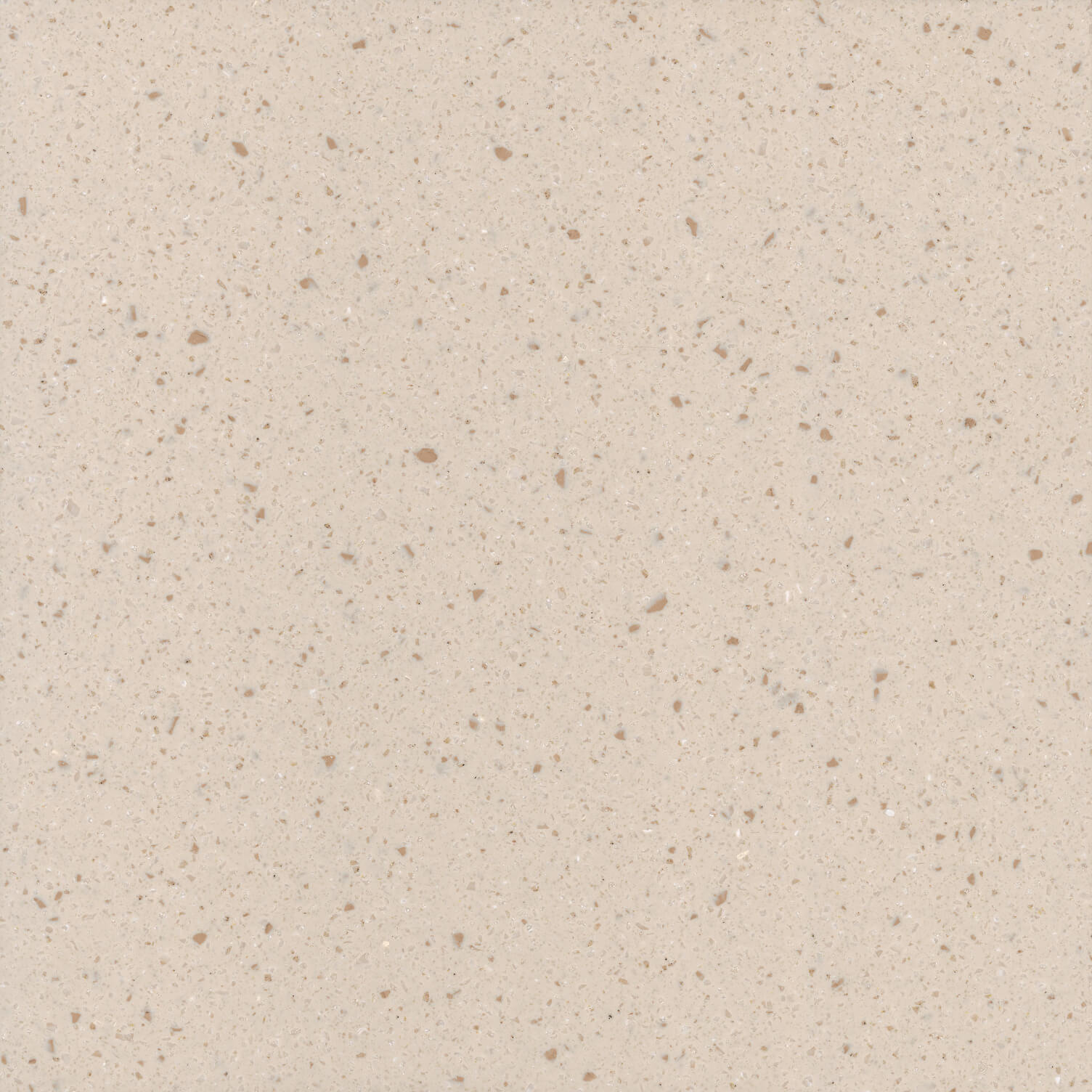 Corian countertops Pebble Lane
Corian countertops Pebble Lane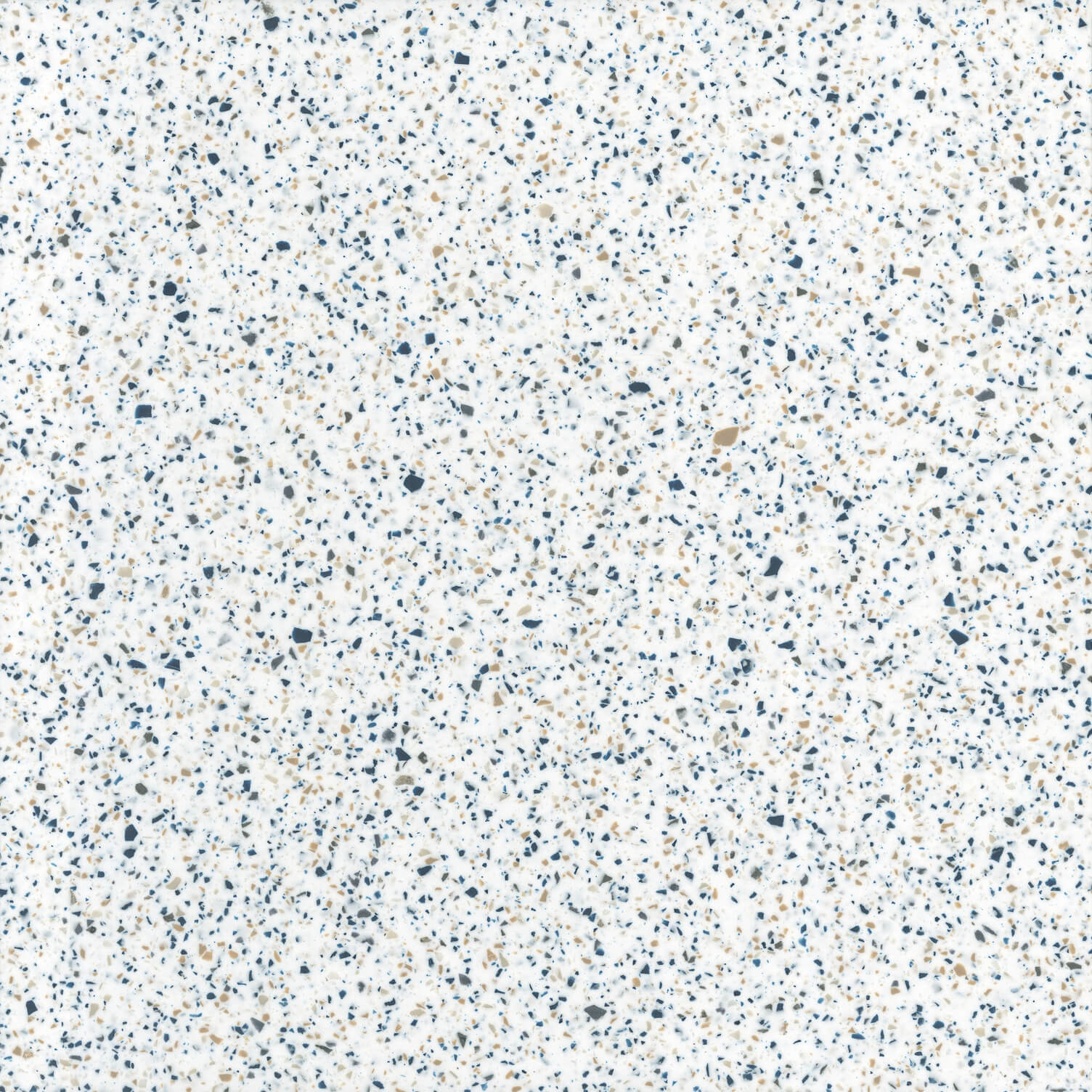 Corian countertops Terrazzo Laguna
Corian countertops Terrazzo Laguna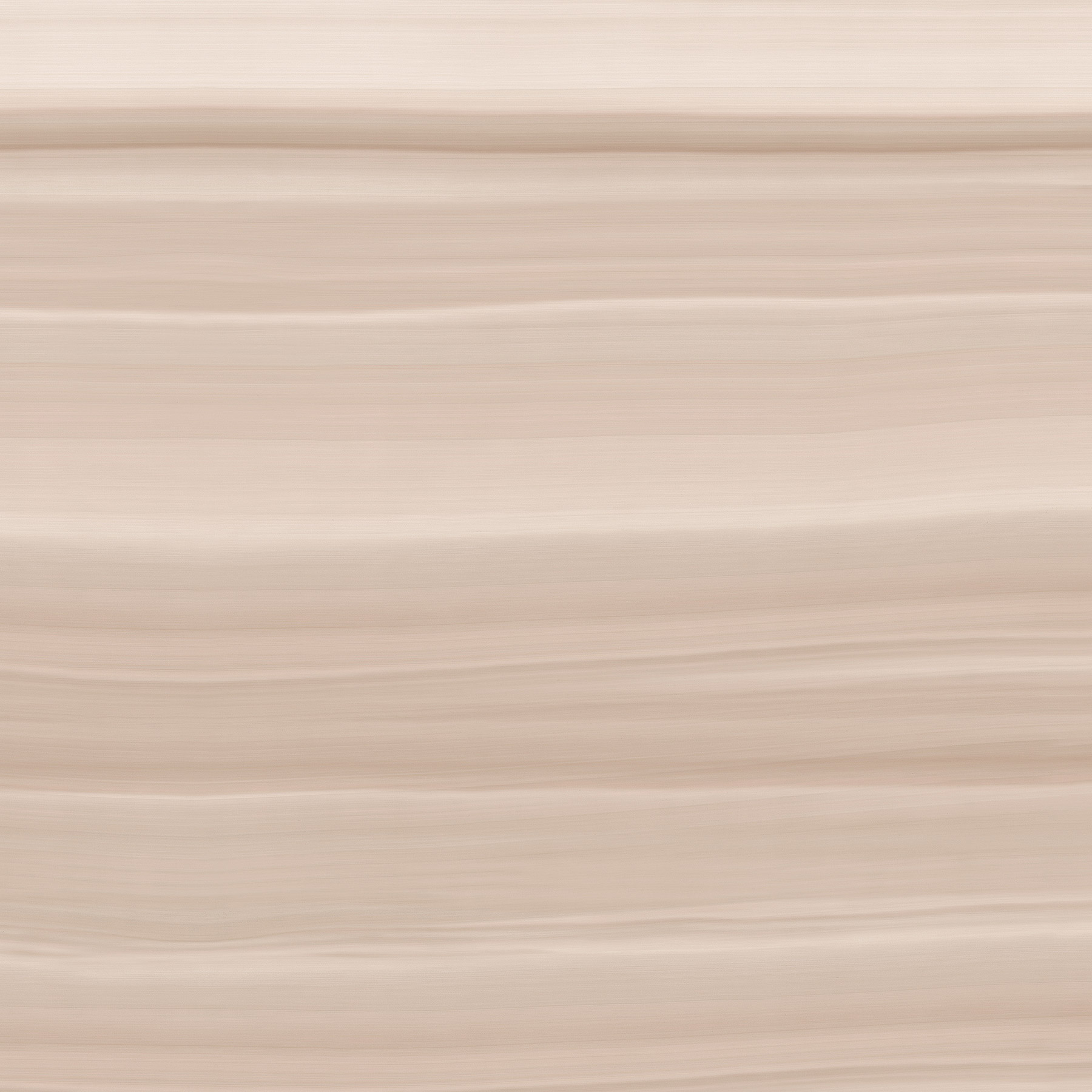 Corian countertops in Bleached Nuwood
Corian countertops in Bleached NuwoodYou can still pick from a wide range of neutral beige and brown colors along with popular grays. Pure black and white Corian countertop colors like Glacier White and Deep Nocturne serve the modern-minimalist aesthetic and work great for a more classic or transitional kitchen design as well.
In addition to stock colors, Corian offers custom color matching for a truly personalized design experience. This customization allows homeowners or designers to align the countertop color with unique elements like fabric or paint samples, further enhancing design cohesion.
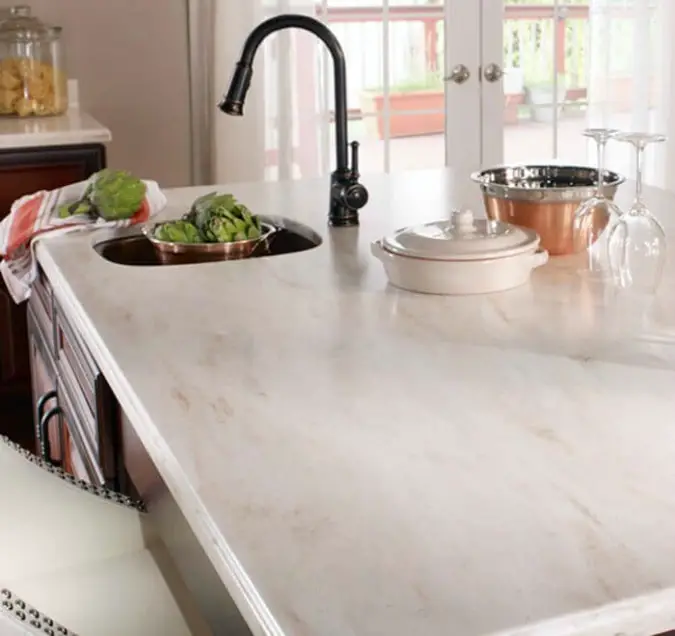
Corian Countertop Edges
The versatility of Corian extends to its edge styles . Corian countertops can be formed and cut into all most any edge profile, ranging from simple eased or bullnose designs to ornate styles like Spanish, Art Deco and laminated edges, which create the appearance of thicker stone slabs.
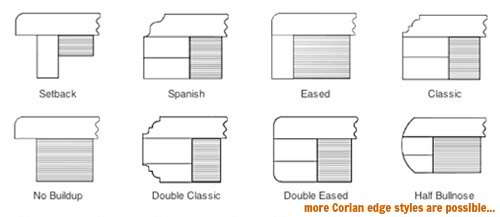
Corian Backsplashes and Sinks
Corian’s integrated sink options offer a wide range of configurations. Single and double bowl designs come in styles like undermount, flush, or integrated sinks, combining classic function with a cohesive look. Corian countertops can also be molded and cut to add custom features.
Integrated backsplashes made from Corian countertop material eliminate the need to install traditional tile, providing a seamless transition from counter to wall.
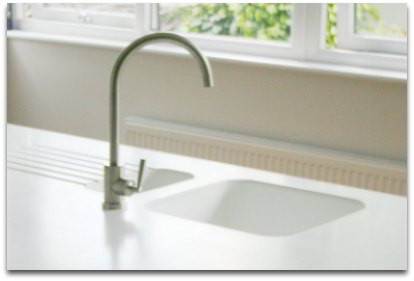
Drainboards for sinks are commonly integrated right into the countertop to help keep the area tidy.
One thing to consider with an integrated sink is that it will get a lot of use; if it gets stained or worn beyond repair, you may have to replace the entire countertop versus just the sink.
Integrated sinks need a bit more care and attention. For instance, Corian states that boiling water should not be poured into the sink as it could warp it.
The one undisputed advantage DuPont Corian and other solid surface brands have over all other materials are the nearly invisible seams.
Corian vs Quartz
Corian and quartz countertops each have unique advantages. Corian is renowned for seamless fabrication that lets designers achieve a sleek, monolithic surface. It’s non-porous, resisting stains and bacterial growth without the need for sealing. Plus, Corian’s versatility supports features like integrated sinks and drainboards, and innovations like wireless charging surfaces.
Quartz countertops are popular for their durability and variety of colors and patterns that resemble natural stone. Engineered from natural quartz crystals combined with resin, these surfaces are exceptionally hard and highly resistant to scratching, chipping, and other damage. Quartz can mimic the appearance of natural stones like granite and marble, while providing more consistency in pattern and color. A non-porous material, quartz also shares Corian’s low-maintenance appeal and requires no sealing.
- Corian is softer than quartz, making it more susceptible to scratching and heat damage
- Quartz is more heat resistant, but it can discolor when exposed to very hot cookware
- Corian is stain resistant but susceptibile to chemical damage, so homeowners must use the right cleaning products
- Corian can cover large areas without seams
- Quartz has a maximum slab size and requires seams in most kitchens
- Corian can usually be repaired when damaged
- Quartz is difficult to repair
Ultimately, the choice between Corian and quartz will hinge on the homeowner’s priority between seamless design and rugged durability.
Corian vs Granite
Both Corian and granite are excellent countertop materials, with different features to offer. Corian distinguishes itself with its modern, seamless appearance and a wide color spectrum that works with nearly any design scheme. Because it can be molded without visible seams, Corian allows designers to create custom solutions such as integrated sinks and backsplashes. Its non-porous nature makes maintenance easier by eliminating the need for regular sealing.
Granite is a natural stone with unique, variegated patterns that add character to a kitchen or bathroom. While it requires regular sealing to protect it from staining, granite is renowned for its durability and heat resistance. Homeowners can place hot cookware directly on its surface without damage, which gives granite an advantage over synthetic countertop materials like Corian.
- Corian is moldable and easier to repair in cases of damage
- Corian will not match the longevity and hardness of granite
- Corian requires no sealing and little maintenance
- Granite is durable and heat resistant
- Granite requires regular sealing
- Granite is typically more expensive than Corian
Ultimately, the choice between Corian and granite depends on the homeowner; will they prefer the sleek adaptability of a modern engineered product or the enduring elegance and rugged natural feel of stone?
Corian Countertop Maintenance
Corian countertops are popular because they’re easy to maintain. A simple routine of wiping with a damp cloth and mild soap will keep them clean. Avoid using harsh or acidic cleaners, as these may damage the surface over time. Instead, we recommend pH-neutral cleaning solutions to maintain the finish without risking discoloration or surface etching.
Corian countertops are sensitive to heat. Direct contact with hot cookware can lead to burn marks, so always use trivets or protective pads when placing hot items on the counter. While non-porous Corian stands up well to most stains, be sure to clean spills promptly to avoid potential discoloration from prolonged contact.
All cleaning products recommended here are pH-neutral, safe, effective, and ideal for use on Corian as well as natural stone and quartz countertops.
Corian Countertop Costs
Corian countertops prices are generally more affordable than granite or quartz countertops.
Pricing for Corian countertops tends to be more budget-friendly compared to high-end alternatives like quartz and granite. Basic Corian countertops start at approximately $35 per square foot, with most installations ranging from $45 to $65 per square foot. This makes Corian countertops competitive with average granite costs, yet significantly cheaper than most quartz surfaces.
Factors affecting the final price include the color choice, complexity of the kitchen layout, and any additional design elements like custom edges, an integrated sink or upgrades like lighting or a charging station. Custom designs can push costs into the $100 to $130 per square foot range. It’s smart to get multiple quotes to compare the costs involved.
Is a Corian Countertop Expensive?
Generally, you can expect to pay 10% to 20% less for Corian than you will for granite, marble, or quartz countertops. But getting detailed bids from several contractors is necessary to accurately determine the cost of your installation.
When comparing solid-surface brands, most will fall into the same price range, although Dupont Corian countertops are usually the most expensive of all brands. However, Corian has the best product with decades of development behind it.
For additional comparison, laminate countertops are still far cheaper than Corian or any solid-surface countertop. Tile countertops and epoxy counters are less expensive as well.
Are Corian Countertops Heat Resistant?
Compared to granite or quartz, Corian is not very resistant to heat. You cannot put hot pots or pans directly on the surface without risking a nasty scorch mark.
Placing pots and pans directly on your kitchen countertop, hot or not, is generally not a good idea with any material.
Even with quartz or granite counters, it is possible that grit trapped under the pot may damage the surface and/or the surface could undergo thermal shock and then crack. It's rare but possible.
However, Corian kitchen countertops cannot withstand heat for long and will essentially melt or burn if pots and pans that are too hot are set directly on it, so always use a trivet.
Countertop appliances that generate heat (like toaster ovens) can sometimes cause damage.
Can Corian Countertops Stain?
Yes, Corian can get stained as no surface is 100% stain-proof. However, a stain on a solid-surface countertop is rare. Most are surface stains from food and easily removed with an abrasive cleaner or pad. Although, discoloring can result from certain cleaners or chemicals.
Be a little picky about the cleaning products you use on your Corian and learn what can damage it or it may prove to be disastrous.
But in general, staining and removing stains in Corian is not a problem.
Scratches are a more common occurrence because solid-surface countertops are relatively soft. The softer material helps prevent breaking dropped dishes but makes it easy to scratch from almost anything. Although, scratches can be sanded out in most cases.
To avoid scratches, always use a cutting board and trivet and refrain from sliding anything across the surface.
Dents aren't as common as scratches, however, but they definitely do sometimes happen if a heavy object is dropped onto the surface.
Are Corian Countertops Durable?
Corian is reasonably durable but other materials are superior. When comparing Corian versus granite countertops, Silestone, or quartz, Corian falls short in the durability department.
- Granite and quartz can take the heat and won't scratch or dent.
- Granite can stain, but these stains can be prevented and removed.
- Quartz can be chemically damaged, although it is rare, but is often permanent when it does happen. So, you will have to weigh all the pros and cons to get a better idea.
The good news is that most damage to Corian can be repaired while damage to quartz often cannot be repaired.
Corian Repair & Warranty
The meaning and benefits of the term "solid-surface" become readily apparent when faced with a Corian countertop repair.
This countertop material is exactly the same all the way through the slab. If you chip or scratch ceramic or plastic laminate, you will see that the inside color is different.
This is not the case with DuPont Corian. You will find that the material is the same color and texture all the way through.
Can Corian Countertops Be Repaired?
Yes. Corian countertops can always be repaired or re-surfaced to eliminate scratches, scorches, and stains. Small dents can often be repaired as well. Generally, Corian repair is a simple DIY job often requiring nothing more than vigorous abrasive scrubbing or sanding.
Sanding out a scratch or blemish is a handy feature of Corian that is certainly beneficial. The only drawback is that in some cases, typically with deeper scratches, you may end up with a depression that may be visible and noticeable to the touch.
Still, it's nice to know that a simple procedure can fix a scratch. And re-surfacing is always an option since the color is uniform through the entire thickness of Corian countertops and other solid-surface brands.
Corian offers a limited 10-year warranty. This sounds great except it only covers product defects which would be a very rare occurrence. And this must be determined by DuPont Corian.
Also, it does not cover staining or chemical damage, heat damage, scratches, dents or outdoor installations (UV rays can yellow or discolor Corian).
Anything that could happen during normal use is typically not covered by the warranty.
An example in the warranty states that if you happen to let a pan overhang the cooktop while heating, the radiant heat from the pan could cause a crack in the countertop. Well, this is not covered because it is considered negligence.
Same deal with leaving bleach on the surface too long. Diluted bleach can be used to clean Corian countertops, but it is not the best choice considering that if you fail to rinse the countertops well, or you accidentally spill a caustic chemical directly on the top, it could discolor Corian.
The idea here is that the product is what it is. It is a solid-surface countertop that is resistant to damage but certainly can be damaged, so they offer no coverage for normal damages. Scratches, dents, and burns are not due to defects in the product.
No countertop material is completely impervious to damage. If you take the time to learn how to properly care for Corian, use common sense, and take reasonable measures to protect the surface (i.e., using cutting boards, setting hot pans on trivets, and using only pH neutral cleaners), then you'll easily avoid some of these more common problems.
The care and maintenance of a Corian countertop is essentially the same as granite or quartz countertops. So, for more Do's & Don'ts and general countertop maintenance information, visit the Care & Cleaning page.
Corian kitchen countertops may not be the most popular luxury choice, but they shouldn't be dismissed either. Corian offers a few very distinct advantages and features along with an upgraded and sophisticated style palette to provide plenty of design possibilities for your home.
How & Where To Buy Corian Countertops
DuPont requires all contractors that sell, fabricate, and install Corian to be certified because this goes a long way in ensuring a quality installation. So, you must find a certified contractor. Luckily, there are many dealers scattered all over the US and DuPont will help you find a Corian installer via their database.
Or you can go through Home Depot which carries Corian countertops, and you can arrange a certified installation from there as well.


